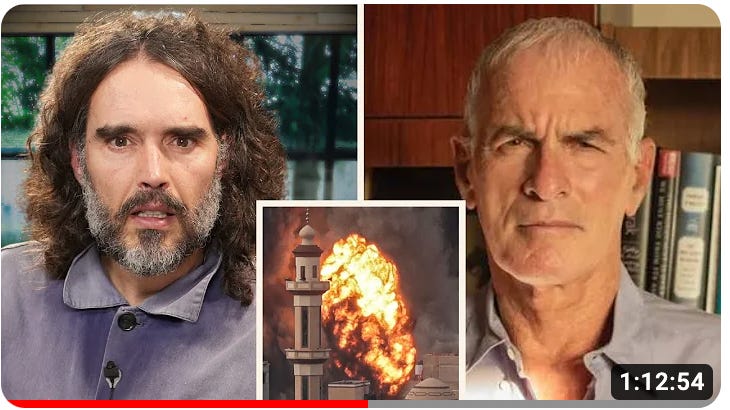The Tragedy of Tribalism
Russell Brand Interviews Norman Finkelstein about Israel and Palestine.
When I was a kid growing up in Texas, one of my favorite stories was that of Cynthia Ann Parker (October 28, 1827 — March 1871). In 1836, when she was nine years old, a Comanche raiding party showed up at her clan’s homestead in Fort Parker, Texas (now Groesbeck) and massacred most of the men and women, including several of her relatives. She was taken by the raiding party, raised to be a Comanche, and ultimately married Chief Peta Nocona, with whom she had a son named Quanah Parker, who grew up to become the last great Comanche chief.
Twenty-four years after she was taken captive by the Comanche, she was again taken captive—this time by a group of Texas Rangers— who forced her to return to European-American society.
Because she’d been assimilated as a Comanche, she was heartbroken by her separation from her family and repeatedly tried to escape to return to her husband and children. The society of her birth was completely perplexed that she had, over the years, come to identify so strongly with the Comanche, especially given that they had massacred (in an exceedingly cruel way) much of her original family.
In 2020, I visited Palo Duro Canyon, just south of Amarillo, Texas, which was the last holdout of Quanah Parker and his Kwahadi (Antelope) band of the Comanche Nation. In 1874, a U.S. Cavalry Regiment led by Colonel Ranald S. Mackenzie ambushed the Kwahadi in Palo Duro and finally succeeded in subduing them. He accomplished this largely by shooting all of their horses.
At the point, Quanah realized he’d been beaten and agreed to settle his band on a reservation in Oklahoma. It’s a notable detail, I think, that he and MacKenzie later became something akin to friends. No doubt Quanah admired Mackenzie’s extraordinary tenacity. Though he came from a wealthy New York family, he was an insanely tough man. Because he was such an effective soldier, the U.S. Army high command gave him seemingly every tough assignment, subjecting him to constant stress and hardship that ultimately took their toll and sent him to an early grave at 48.
I was reminded of the ferocious 19th century Indian Wars when I listened to Russell Brand’s recent interview with Norman Finkelstein on the latest ferocious conflict between Israelis and Palestinians. Finkelstein is a complex and controversial character, and though I’ve read a couple of his books with great interest and even amusement (he can be quite funny), I’ve never really known what to make of him.
He seems to have spent a great deal of time researching this region of the world. At the same time, he seems to have a predilection for sympathizing with the underdog that may make him biased. In sharing this interview, I am not proposing that it is gospel. I encourage the listener to do his own research and form his own opinions.
What Finkelstein describes in this interview—expertly conducted by Russell Brand—strikes me as a perfect expression of tribal warfare. The logic of tribal warfare can be reduced to the old Wild West saying, “There’s not enough room in this town for both of us,” and it seems it can only end when one tribe has been completely subdued and driven away, like the remnants of the Comanche being resettled on a reservation in Oklahoma.
When we are presented with the spectacle of tribal warfare, we are naturally inclined to take sides. We are told opposing accounts of atrocities committed by one side or the other. Reprisal begets reprisal. Bitter hatred and the desire for revenge result in a dialectic of hatred that never resolves.
On the northern approach to Dubrovnik in 2006, I stopped at a gas station that was decorated with photographs of the same gas station after it had been shelled in 1991 by (mostly Serbian) units of the Yugoslavian Army. The gas station owner spoke a bit of German, so I asked him:
“What was the strategic value of shelling Dubrovnik?”
“There was no strategic value!” he exclaimed. “The city was shelled by madmen, vandals, and murderers.”
I marveled that a man could make his filling station into a monument of the perfidy of his neighboring country, and think about it every day at work for fifteen years.
One of the many terrible features of the human condition is that we, as a species, can never seem to overcome our tribal, warlike nature. We seem to be stuck with it.







No comments:
Post a Comment